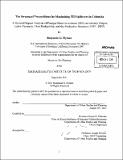| dc.contributor.advisor | Karen R. Polenske. | en_US |
| dc.contributor.author | Hyman, Benjamin G. (Benjamin Gabriel) | en_US |
| dc.contributor.other | Massachusetts Institute of Technology. Dept. of Urban Studies and Planning. | en_US |
| dc.coverage.spatial | s-ve--- | en_US |
| dc.date.accessioned | 2012-02-29T17:56:33Z | |
| dc.date.available | 2012-02-29T17:56:33Z | |
| dc.date.issued | 2011 | en_US |
| dc.identifier.uri | http://hdl.handle.net/1721.1/69454 | |
| dc.description | Thesis (M.C.P.)--Massachusetts Institute of Technology, Dept. of Urban Studies and Planning, 2011. | en_US |
| dc.description | Cataloged from PDF version of thesis. | en_US |
| dc.description | Includes bibliographical references (p. 78-80). | en_US |
| dc.description.abstract | Do multinational corporations (MNCs) crowd out domestic firms in developing countries, or is foreign direct investment (FDI) complementary to domestic firm profitability, productivity, and employment? Empirical literature has identified diverse channels through which FDI facilitates aggregate spillovers to the host economy-including total factor productivity (TFP) transfers, employment generation, as well as backward and forward linkages-however there is much less consensus regarding the structural preconditions that maximize the net gains from such spillovers. In this work, I quantify the trade-offs from FDI across ten expansive sectors of the Colombian economy, combining econometric and inter-industry linkage analyses to capture the impact of FDI on industry output, labor payments, firm productivity, and productive diversification. I first apply fixed effects multivariate regression models to a rich longitudinal panel of Colombian and foreign firm financial statements to capture the marginal effect of a 1% increase in MNC sector output share on domestic industry output and labor payments (as a proxy for employment). Combining this dataset with information from the Colombian national accounts, I construct annual input-output tables distinguishing domestic from MNC intermediate purchases, improving on the proxy for backward linkages proposed by Javorcik (2004). I then test for total factor productivity (TFP) spillovers by sector controlling for factor inputs at the firm level, and instrument for FDI using average wage data on sending countries to improve causal inference. I find a negative and statistically significant correlation between foreign share of sector output and domestic sector revenue-a 1.8% average decrease in domestic revenue for a given 1% increase in MNC sector output share. The impact on wages at the industry level yields a similar result-a 1% increase in foreign share of output is associated with a 2.3% decrease in average domestic labor payments. The results also suggest countervailing positive and statistically significant (causal) TFP spillovers-a 1% increase in MNC causes a 2.2% increase in average domestic firm revenue through horizontal TFP spillovers, and a 160% increase in firm revenue through backward TFP spillovers to the manufacturing sector. Further decomposing these effects by industry reveals that specific sectors drive the overall results. We observe that the magnitude of FDI spilllover depends on sector-specific structural characteristics that may or may not be conducive to growth-perhaps warranting strategic industrial, competitiveness, and FDI targeting policies that are differentiated by the unique role FDI plays in each sector. | en_US |
| dc.description.statementofresponsibility | by Benjamin G. Hyman. | en_US |
| dc.format.extent | 80 p. | en_US |
| dc.language.iso | eng | en_US |
| dc.publisher | Massachusetts Institute of Technology | en_US |
| dc.rights | M.I.T. theses are protected by
copyright. They may be viewed from this source for any purpose, but
reproduction or distribution in any format is prohibited without written
permission. See provided URL for inquiries about permission. | en_US |
| dc.rights.uri | http://dspace.mit.edu/handle/1721.1/7582 | en_US |
| dc.subject | Urban Studies and Planning. | en_US |
| dc.title | The structural preconditions for maximizing FDI spillovers in Colombia : a sectoral impact analysis of Foreign Direct Investment (FDI) on Industry output, labor payments, firm productivity, and the productive structure (1995-2009) | en_US |
| dc.title.alternative | Structural preconditions for maximizing Foreign Direct Investment spillovers in Colombia | en_US |
| dc.title.alternative | Sectoral impact analysis of Foreign Direct Investment (FDI) on Industry output, labor payments, firm productivity, and the productive structure (1995-2009) | en_US |
| dc.type | Thesis | en_US |
| dc.description.degree | M.C.P. | en_US |
| dc.contributor.department | Massachusetts Institute of Technology. Department of Urban Studies and Planning | |
| dc.identifier.oclc | 774910685 | en_US |
